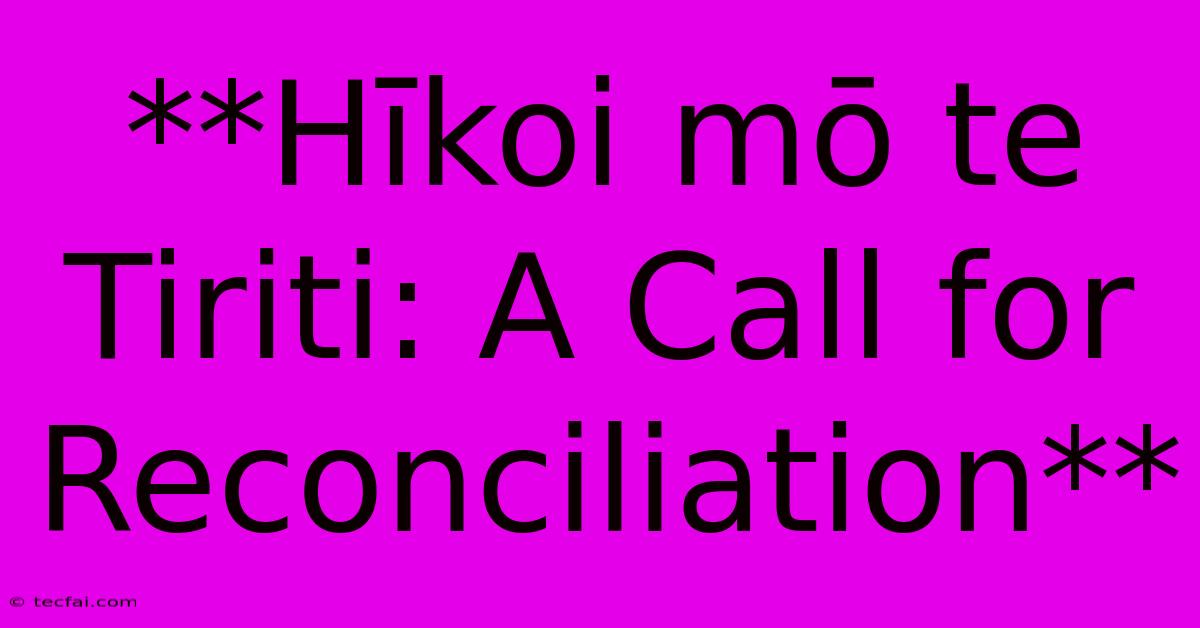**Hīkoi Mō Te Tiriti: A Call For Reconciliation**

Discover more detailed and exciting information on our website. Click the link below to start your adventure: Visit Best Website tecfai.com. Don't miss out!
Table of Contents
Hīkoi mō te Tiriti: A Call for Reconciliation
The Treaty of Waitangi, signed in 1840, is a foundational document in New Zealand's history. However, its legacy is complex and fraught with issues of colonization, land dispossession, and ongoing injustices faced by Māori. In recent years, there has been a growing movement towards reconciliation, with many individuals and organizations recognizing the need to address the Treaty's unresolved issues and build a more equitable future for all New Zealanders.
The Importance of Hīkoi
A hīkoi is a traditional Māori practice of walking, often undertaken for a specific purpose or cause. It is a powerful symbol of collective action and commitment. In the context of the Treaty of Waitangi, hīkoi have been used to raise awareness of injustices, advocate for change, and foster dialogue between Māori and Pākehā (non-Māori).
Hīkoi mō te Tiriti: A Call for Action
Hīkoi mō te Tiriti (walks for the Treaty) are a crucial step in the journey towards reconciliation. These walks serve multiple purposes:
- Raising Awareness: Hīkoi bring the Treaty's significance and its ongoing impact to the forefront of public discourse. They highlight the need for a deeper understanding of the Treaty's provisions and their implications for both Māori and Pākehā.
- Advocating for Change: Hīkoi are a platform for advocating for policies and actions that promote justice, equity, and respect for the Treaty's principles. Participants call for accountability, redress, and meaningful engagement with Māori in decision-making processes.
- Fostering Dialogue: Hīkoi encourage conversations and connections between Māori and Pākehā. By walking together, participants share stories, perspectives, and experiences, creating opportunities for understanding and empathy.
The Role of Reconciliation
Reconciliation is not simply about saying sorry or forgetting the past. It is a complex process that requires ongoing commitment, action, and a genuine desire to build a future where the principles of the Treaty are upheld. Key elements of reconciliation include:
- Acknowledging and Apologizing for Past Wrongs: Recognizing the historical injustices inflicted upon Māori and expressing sincere apologies for the harm caused.
- Promoting Treaty Education: Ensuring that all New Zealanders have access to comprehensive and accurate education about the Treaty, its history, and its ongoing relevance.
- Redressing Historical Grievances: Addressing issues of land dispossession, cultural suppression, and economic disparities through appropriate mechanisms like Treaty settlements and restorative justice initiatives.
- Building Partnerships: Fostering genuine and respectful partnerships between Māori and Pākehā, where both communities work collaboratively towards shared goals.
Moving Forward: A Call to Action
Hīkoi mō te Tiriti are a powerful reminder that the journey towards reconciliation is ongoing. We must all play a role in supporting this movement:
- Educate Yourself: Learn about the Treaty of Waitangi, its history, and its relevance today.
- Engage in Dialogue: Talk to Māori about their perspectives and experiences. Listen with an open mind and a willingness to learn.
- Support Reconciliation Initiatives: Get involved in organizations and events promoting reconciliation.
- Hold Leaders Accountable: Advocate for policies and actions that uphold the principles of the Treaty.
The Treaty of Waitangi holds the promise of a shared future based on respect, partnership, and justice. Through hīkoi and a commitment to reconciliation, we can work towards fulfilling this promise and building a more just and equitable Aotearoa for all.

Thank you for visiting our website wich cover about **Hīkoi Mō Te Tiriti: A Call For Reconciliation** . We hope the information provided has been useful to you. Feel free to contact us if you have any questions or need further assistance. See you next time and dont miss to bookmark.
Featured Posts
-
Three Takeaways Flames Win Big
Nov 13, 2024
-
Duhan Musician Confirmed In Drowning Incident
Nov 13, 2024
-
Fresh Faces Enter Mcg Challenge
Nov 13, 2024
-
New Energy The Future Is Here
Nov 13, 2024
-
Gmb Doctors Simple Lunch Plan
Nov 13, 2024
